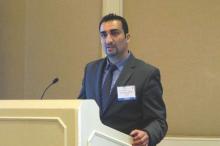Gambling behavior can be considered in three levels, recreational gambling, where there are no repercussions related to gambling; subthreshold gambling disorder, where the individual encounters gambling-related problems but does not meet the diagnostic threshold for a disorder, although is at an increased risk of developing a gambling disorder at some point in the future; and gambling disorder. A gambling disorder is characterized by “persistent, recurring and sometimes progressive maladaptive gambling behavior despite the negative consequences,” with behavior that has the greatest social, psychological, and medical impact. Those with a subthreshold gambling disorder are at a higher risk, but whether recreational gamblers are at increased risk is less clear, said Dr. Parhami, who formerly was affiliated with the UCLA gambling studies program.
In the DSM-5, gambling disorder now appears under “non substance-related disorders” in the substance-related and addictive disorders section, and is defined as “persistent and recurrent problematic gambling behavior leading to clinically significant impairment or distress,” as indicated by the individual exhibiting at least four of nine symptoms over a 12-month period: preoccupation, tolerance, withdrawal (developing symptoms like anxiety when they do not gamble), loss of control, escapism, dishonesty, risk-taking behaviors related to gambling, chasing (returning another day to get even after losing money gambling), and bailouts (relying on others to provide money to relieve a desperate financial situation caused by gambling). These symptoms are similar to other addictive disorders, and loss of control is probably the main symptom, Dr. Parhami said.
Identifying a patient with a gambling disorder at an earlier stage and preventing progression also can reduce the risk of developing a comorbid disorder, because any level of gambling is associated with an increased risk for developing comorbid mental disorders, according to Dr. Parhami and Dr. Fong, two of the authors of a recently published prospective study, which compared the incidence of new onset comorbid disorders among people at three levels of gambling behavior, to those who did not gamble at all.
Using longitudinal data from the National Epidemiologic Survey on Alcohol and Related Conditions, researchers divided respondents into three groups: those with a gambling disorder, those with a subthreshold gambling disorder, and those who were recreational gamblers. Three years after their initial interview for the survey, those in all three groups were at a statistically significantly increased risk of having any mood, anxiety, or substance abuse disorder, compared with controls who did not gamble at all (J. Psychiatr. Pract. 2014;20:207-19).
Overall, those in the three gambling behavior categories were at a more than twofold greater risk among those with gambling disorder diagnosis at baseline, with an odds ratio – adjusted for age, sex, marital status, annual income, and education – of 2.5. The risk also was significantly increased among those with a subthreshhold gambling disorder at baseline (odds ratio, 1.77) and even among those who were recreational gamblers at baseline (OR, 1.16).


